- Home
- Chaim Potok
The Gift of Asher Lev Page 6
The Gift of Asher Lev Read online
Page 6
To the right of my parents’ home stood the three-story home of my aunt and uncle. Three houses down from my uncle’s home, on a rise beyond a gently sloping lawn and a juniper hedge, stood the large red-brick home of the Rebbe.
Every morning that week my father and I rose early and walked together to my uncle’s house. About fifty feet of sidewalk separated the cement walks that led to the porches of the two homes.
On the first morning after the funeral we came out the front door into a gray and chilly dawn. Mist clung to the bare branches of the trees. I felt the cold air sting my face, and I shivered. Once I had played with my mother in snow, running with her through drifts, our galoshes kicking soft sprays into the frigid air. She would toss snowballs at the trees, her arms making the awkward motions of a little girl. I had loved the snow and made many drawings of my mother in it. Now the mild cold of an April morning seemed unendurable to me.
About thirty men were in the living room of my late uncle’s house, some sitting quietly in their prayer shawls and tefillin, others still winding the straps around their arms and foreheads. Everyone wore the early-morning look of recent sleep and fresh beginnings. I took a chair in the back row, wrapped myself in my tallis, and quickly put on my tefillin. Someone slid into the chair next to mine: the same ninety-two-year-old man who had sat there the day before. His large tallis was yellow with age; the uncommonly wide straps and oversize boxes of his tefillin were shiny black. He gave me a faint nod and turned his attention to the Book of Psalms in his hands.
The younger of my uncle’s two sons, Cousin Nahum, a short, round, balding man in his forties, led the service in a thin, unmelodious voice. I was quickly caught up in the words, lost awareness of where I was. The images in the morning blessings moved before me. Opens the eyes of the blind; clothes the naked; sets the earth firmly in the waters. The binding of Isaac. The Psalms. The Song at the Sea. The Unity of God. And entering now the breadth and length and depth of the river, stepping into the first flow above-ground, the trickle of water, exploring it to its expansion at its underground source. And the head filled with images but the hand mysteriously inert. I stare at my right hand: the skin coarsened by pigments and chemicals; the fingers thin, bony; the nails broken, chewed; the hand of a longshoreman. Once the fingers would twitch of themselves, initiate the motions of art as if they were creatures of their own, separately attached to the images within my eyes. But not any longer. The hand lies dormant.
The service came to an end. I began to remove my tefillin. My aunt and her two daughters entered from the hallway, where they had sat throughout the service, and now returned to their stools in front of the oil painting of the Rebbe. Cousin Nahum and Cousin Yonkel finished removing their tefillin and prayer shawls. People came over to them, spoke the words of consolation, and hurriedly left. It was a weekday, and most of the men had work to go to and a living to make.
Next to me, the old man finished folding his prayer shawl and said, “Good morning, Asher Lev.”
“Good morning.”
“You pray like a true Ladover.”
“Why not? I am a Ladover.”
“I must say to you I never imagined that a man who paints the kind of pictures you do would pray in such a way. It is a perplexity to me.”
“Why?”
“The Torah forbids such pictures.”
“Where is it written?”
“In the Ten Commandments.”
“The Ten Commandments forbid the worshipping of pictures, not the making of them.”
“Asher Lev, they forbid the worshipping and the making. How can pictures such as yours not be forbidden?”
“Not all understand the Second Commandment in that way.”
“It is the way the Ladover understand it. Tell me, are you truly a Ladover Hasid? What a father is, is one thing. A son does not always follow a father.”
“I consider myself a Ladover Hasid.”
“Then how does a Ladover Hasid paint such pictures? I do not understand.”
“In this matter, I disagree with the Ladover.”
“It is not a small matter. The whole world knows of Asher Lev and what he paints.”
“With all respect, it is not a clear issue. The Code of Law forbids full-face pictures.” I cited the passage. “And yet look there at the painting of the Rebbe.”
His aged eyes flew open. He seemed horrified. “You compare a picture of the Rebbe to the pictures you make? God forbid!”
“I did not mean to upset you.”
“Such a thing to say! A shame, a scandal!”
He clutched his tallis and tefillin bags to himself as if he feared a touch from me would pollute them. He shook his head and muttered as he went past me. I watched him go over to the mourners, speak to them briefly, and hurry out of the room. He walked fairly briskly for a ninety-two-year-old man, urged on no doubt by his need to distance himself from the demons in Asher Lev.
The wooden folding chairs stood in disarray, and I went quickly through the room, setting them in their orderly rows. The room was now empty of visitors. My father and my uncle’s family went into the kitchen. I was alone in the living room with the oil painting of the Rebbe, and I went over to it. Smooth and slick. But he had caught the eyes and the mouth. The eyes followed you, the mouth smiled its benevolence upon the viewer, speaking a silent blessing. Three will save us, I heard the mouth say distinctly in the silence of the living room. The third is our future. I looked quickly around. I was alone in the room.
My aunt was calling me. I joined my father and my uncle’s family in the sunlit breakfast room. The picture window looked out on the terrace and the back lawn. Two large-leaved potted plants sat on the sill amid an array of charity boxes. Set in a wall was a bookcase filled with cookbooks and paperbacks. One of the paperbacks was a collection of essays by a contemporary New York art critic. I knew it contained a chapter on me and my work. I wondered who in this house was reading art criticism.
I sat between my father and Cousin Nahum. My two women cousins looked uncomfortable with me in the room. The table, large and round, was arrayed with smoked fishes, bagels, cream cheese, fruit juice, coffee.
“How are you, Asher?” Cousin Nahum asked. “We haven’t had a chance to talk.”
“Asher, have something to eat,” my aunt said gently.
“How’s the paint business?” Cousin Yonkel asked. He was younger, taller, and thinner than his brother, had an untrimmed dark beard, an angry mouth, and glittering dark eyes that had long ago found the answers to the world’s difficult questions.
“Yonkel, it’s too early in the morning for your jokes,” Cousin Nahum said.
“Did you hear the Jackie Mason line?” Cousin Yonkel said. “It took Michelangelo twenty years to paint the Sistine ceiling. Did you know that? Twenty years. Jackie Mason says his brother-in-law could do it in two days.”
“Yonkel,” one of the sisters said. “This is not a good time for jokes.”
“It’s a funny line,” Yonkel said.
“Yonkel,” my father said quietly.
That stopped him. He gazed down at the table and ate in silence.
“We read about the exhibition in Paris,” Cousin Nahum said.
I looked at him and did not respond.
“We may not like what you paint, Asher, but we also don’t like it when you’re hurt.”
“Speak for yourself,” Cousin Yonkel said.
“Yonkel,” Aunt Leah said. “For your father’s sake, let there be peace.”
Yonkel lapsed back into dour silence.
“Asher,” Cousin Nahum said. “Can you stick around awhile?”
“Sure.”
“I want to show you something.”
I saw Cousin Yonkel raise his eyes and stare at his brother. “What do you think you’re doing?”
“It’s not your affair,” Nahum said.
“What do you mean, it’s not my affair. Are you the only son in this family?”
Cousin Nahum looked at my
aunt. “Mama?”
“In this matter, Nahum decides,” Aunt Leah said. “That was the wish of your father.”
I looked around the table. It was clear to me that I was the only one there who did not understand what was happening.
“What’s going on?” I asked.
“Finish your breakfast,” my father said quietly. “Nahum will explain it to you later.”
“All I want to do is show you something,” Cousin Nahum said.
“Asher, how are the children?” Aunt Leah asked.
“They’re fine. Avrumel is running a little fever.”
“Rocheleh starts in our yeshiva today,” my father said.
“Really?” my aunt said. “What a good idea!”
“It was Rivkeh’s idea,” said my father.
“Bring them over later, Asher,” said my aunt.
“She is a very smart girl, our Rocheleh,” my father said. “Her English is excellent.”
“How can a child of Asher Lev’s not be smart?” Cousin Yonkel said.
“For God’s sake, Yonkel,” Cousin Nahum said. “Asher is a guest in our house. How often do we see him? Ease up a little on the sunny disposition.”
Cousin Yonkel returned to his gloomy silence and his food.
We finished breakfast and quietly said the Grace After Meals. My aunt and her daughters began to clear the table. My father and Cousin Yonkel returned to the living room.
“Asher, come upstairs with me,” Cousin Nahum said.
I followed him through the dining room and the hallway and up the stairs. He walked slowly and seemed to have difficulty breathing, and I wondered if he might have something wrong with his heart. One flight of carpeted stairs, and he was wheezing and sweating. It occurred to me that I didn’t know where he lived. A private house? An apartment? I didn’t know where any of my four cousins lived. I had never even met their wives, husbands, or children.
I followed him along the second-floor hallway to the door of my uncle’s study. He fished in his pocket, brought out a key ring, selected a key, and opened the door.
“My father said you’d appreciate this.”
We stepped inside. The door closed smoothly and soundlessly behind us.
I had been in my uncle’s study many times when I lived in this house. Now I could barely make out the furniture and the walls for the dimness. Heavy drapes lay across the windows. The air in the room was fresh. I heard a faint humming sound as from some muffled machine.
“I’ll get the drapes,” Cousin Nahum said, and crossed the room to the windows.
Morning sunlight entered the room as the drapes were slid aside. The room was entirely different now from when I was last inside it, more than twenty years before. I saw an ornately carved desk, a tall-backed dark leather chair, a dark leather recliner, a lavish Oriental carpet with a floral and bestiary design, a large dark wood door near the door to the room, and, on the dark-paneled walls—paintings. Three large paintings. The easily recognizable styles leaped out at me. I felt myself stunned by the shock of their utterly unaccountable presence in this house.
“My God!” I heard myself say.
On the walls were a Matisse landscape of the south of France done nearly in the full spectrum of Matisse’s palette: cadmium red, purple red, emerald green, Prussian blue, cobalt blue, ultramarine, cadmium yellow, ochre, burnt sienna, black, zinc white; a Cézanne oil on canvas of Mont Sainte Victoire seen through and over a line of tall leaning cypresses; and a shimmering Renoir of a garden made when he lived in Cagnes, a few kilometers from my home.
I was finding it difficult to breathe.
“Neat, eh?” Cousin Nahum said. “You like them?”
“I can’t believe what I’m seeing here.”
“Yonkel hates them.”
“Yonkel is a barbarian.”
“He thinks in this matter Papa was the barbarian.”
“These are magnificent paintings.”
“I’ll tell you the truth: I don’t know anything about art. To me it’s all the same, this painting, that painting. Someone told Papa that art was a good investment, so he invested in it like he invested in stocks.”
“Who advised him?”
“A dealer from Chicago. A Ladover sympathizer. He knew my grandfather, Mama’s father, may he rest in peace.”
“Smart man.”
“Who? The dealer? Papa?”
“Both.”
“They’re worth a lot of money?”
“Money! There are great human souls in those paintings.”
He gazed at the walls. “I see souls in Torah and in the commandments, not in paintings. Are they worth money, Asher?”
“Are you serious? There’s a fortune on those walls.”
“There is? Well, that may make Yonkel a little happier. I don’t know the first thing about it. It reminds me of a friend of mine, not a Ladover but an observer of the commandments, who collects rare wine, even though we’re forbidden to drink goyishe wine. I asked him once why he collects wine that he can’t drink, and he told me it was for an investment. Wine for an investment! Can you believe it? I don’t understand it. Wait a minute. I’ll show you something else. Come on.”
He drew the drapes and led me back into the hallway and locked the door. “You’ll remember this. It’s where you worked when you lived with us.”
I followed him to the doorway that led to the attic. He opened it with a different key from the one he had used on the door to the study. The narrow stairway led up into deep shadows. He flicked a switch on a panel just inside the door, and a burst of light flooded the stairs and the area overhead. The wooden stairs, raw and scarred when I had worked there, were now thickly carpeted. I followed him up into the attic.
The air was cool and fresh. When I had worked there, the attic, redolent of my oil paints, was often sweltering in the summer and freezing in the winter. The room, nearly as large as the entire expanse of the house, had been bare, its wooden floor naked, its ceiling beams exposed, its single tall window facing the trees on the street outside and always open to the light. Now the floor was covered with rich carpeting; heavy drapes concealed the window; and along the walls were deep floor-to-ceiling metal racks filled with canvases, drawings, and prints.
Cousin Nahum pulled out drawings and held them to the light. He showed me a harlequin drawing by Picasso, dated 1919; a drawing of Virginia Haggard by Chagall, with his signature—”Marc”—under the words Pour Virginia mon amour, and dated Vence, 1952; a painting by Magritte of a man gazing at an image of himself in the forehead of another man, whose features were identical to those of the first man; drawings and canvases by Chirico, Bonnard, Modigliani, Soutine. I watched him return a Soutine canvas to the rack, and then I asked him if he would let me look through the racks by myself, and he said sure, but we would have to go down soon, people would be coming into the house. In one of the racks I found oil paintings and prints by Reuven Rubin, Raphael Soyer, Bergner, Bak, Ardon, Bezem, Theo Tobiasse, Ben Shahn. In another were drawings and lithographs by modern masters; there was one by Picasso of a Guernica study that I had not known existed. A third rack was entirely filled with my own work—oils, drawings, pastels, prints. I went through that collection very quickly—Cousin Nahum was becoming impatient—and noticed that my uncle had acquired a copy of my first carborundum print, the one I had made in Paris with the help of Jacob Kahn during one of the early years of my exile. His copy was numbered 7/20. All the copies of that print were in museums and private collections; none had entered the market in over ten years.
I saw no nudes anywhere in Uncle Yitzchok’s collection.
Cousin Nahum was telling me there would be other times for me to look at the art; we had to go back downstairs. I followed him down the narrow staircase. He turned off the lights and locked the door. We went down to a living room crowded with dark-garbed men and kerchiefed women.
That was a long and wearying day, that first full day of mourning. I sat in the living room listening to Torah discu
ssions and praise of my uncle and chatter about this one’s illness and that one’s children and sober talk about security problems in the neighborhood and the rash of recent street violence. A small crowd had gathered around my father, who listened and responded, and I noticed how silent people became when he spoke, how they leaned forward to catch his words. There was a soft electric intensity to his rhythmed speech, to the slight nasalities that accompanied some of his words, to the way his nostrils flared on occasion and his lips worked. Even seated he looked taller than anyone else in that room.
People seemed to be coming from everywhere. My mother’s sister, Aunt Leah Chayah, who had been unable to attend the funeral because her husband had undergone bypass surgery the day before, flew in from Boston. She was a short, robust woman in her late sixties or early seventies. Yes, the surgery was successful. The miracles they can do today. We have to thank the Master of the Universe. She sat quivering and talking to my father and to my uncle’s family. My mother was teaching a class at the university and would come in the late afternoon. There were people from Philadelphia, Cleveland, Detroit, Chicago, Miami, Albany, Tucson, Houston, San Francisco, Seattle. I met the art dealer who had helped my uncle put together his collection, a cheerful, round-faced man named Abraham Vorman, who wore a pale-blue suit, pink shirt, light-green tie, earth-brown shoes, and a dark-red Alpine hat with a yellow feather in its band. I wondered who advised him on his clothes: he looked like a Fauvist painting. “Honored, Mr. Lev. Truly honored. Too bad for me you have a dealer, or we could talk serious business. Douglas Schaeffer treats you well? Ah, too bad. Anytime you are looking for greener fields, anytime.”
The head of the Ladover movement on the West Coast showed up and was introduced to me by Cousin Nahum. “Rav Yosef Kroner. Asher Lev.” He was a short, intense, dark-visaged, dark-bearded man about my age, with darkly gleaming eyes and a frosty smile. “You are Asher Lev? The trouble you make for us!” Later, I saw him talking in the hallway to a group of younger Ladover men and heard him utter the words meridoh bemalchus—a term meaning “rebellion against the kingdom”—spitting them out with a venomous anger that left me chilled even though I had no idea what he was talking about.

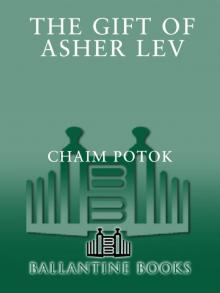 The Gift of Asher Lev
The Gift of Asher Lev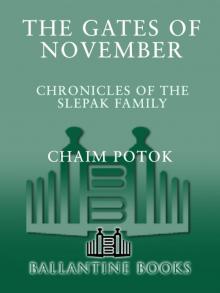 The Gates of November
The Gates of November In the Beginning
In the Beginning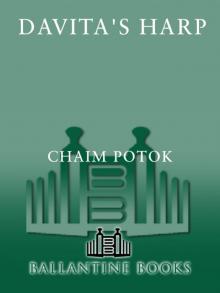 Davita's Harp
Davita's Harp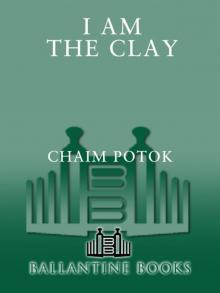 I Am the Clay
I Am the Clay The Promise
The Promise The Chosen
The Chosen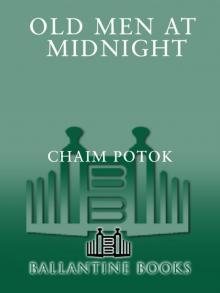 Old Men at Midnight
Old Men at Midnight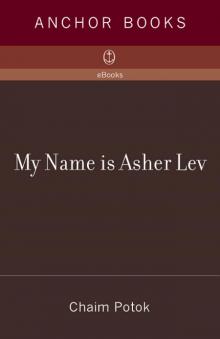 My Name Is Asher Lev
My Name Is Asher Lev